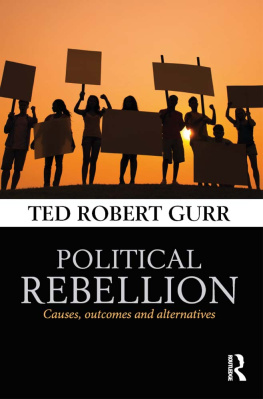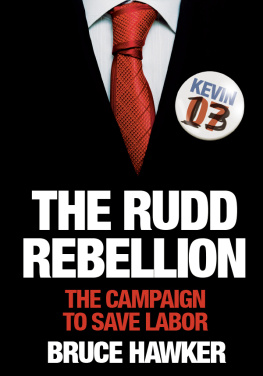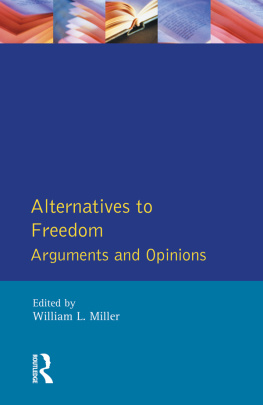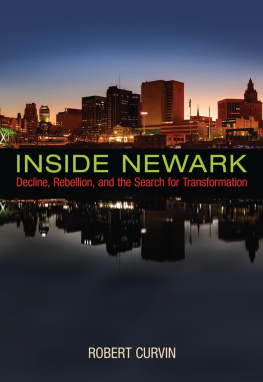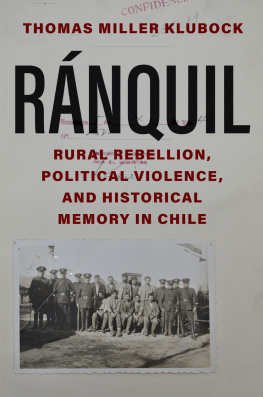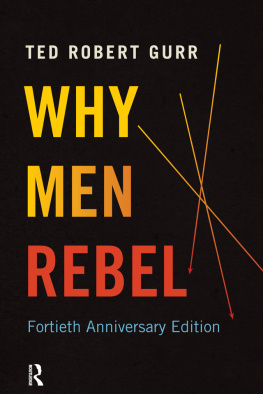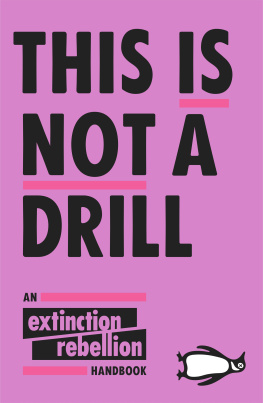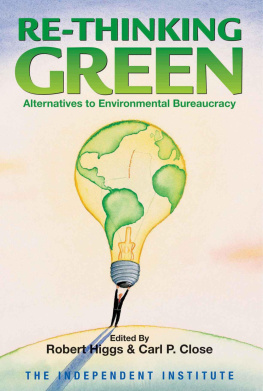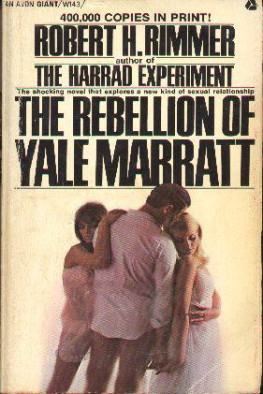POLITICAL REBELLION
This volume comprises key essays by Ted Robert Gurr on the causes and consequences of organized political protest and rebellion, their outcomes, and strategies for conflict management.
From the Castro-inspired revolutionary movements of Latin America in the 1960s to Yugoslavias dissolution in the ethnonational wars of the 1990s, and the popular revolts of the Arab Spring, millions of people have risked their lives by participating in protests and rebellions. Based on half a century of theorizing and social science research, this book brings together Gurrs extensive knowledge and addresses the key questions surrounding this subject:
What grievances, hopes and hatreds motivated the protesters and rebels?
What did they gain that might have offset myriad deaths and devastation?
How effective are protest movements as alternatives to rebellions and terrorism?
What public and international responses lead away from violence and toward reforms?
The essays in the volume are updated and are organized around the evolving themes of the authors research, including theoretical arguments, interpretations, and references to the evidence developed in his empirical research and case studies. The concluding essays bring theory and evidence to bear on the past and future of political violence in Africa.
This book will be of much interest to students of rebellion, political violence, conflict studies, security studies, and IR.
Ted Robert Gurr is Distinguished University Professor Emeritus in the Department of Government and Politics, University of Maryland, USA. He is internationally recognized for his theoretical, comparative, and historical studies of societal conflict, and is author of the award-winning books Why Men Rebel (1970, 2010) and Violence in America (1969, 1979, with Hugh Davis Graham). His most recent book is Crime-Terror Alliances and the State (Routledge 2013, with Lyubov Mincheva).
For many years, Ted Gurr has been one of our most important and innovative thinkers about revolution, rebellion, ethnic violence, and regime change. Much of what we know, and can measure, about discrimination, democratization, and political crises we owe to his work. And yet, the sum is even more than the value of the parts. Gurrs work across topics from civil war to terrorism builds a rich theory of political conflict. Scholars who have read only portions of Gurrs work will find new insights and pleasures here; thanks to Routledge for making these treasures available in one volume.
Jack Goldstone, George Mason University, USA
The volume brings together the fruits of a lifetime of research on political violence and conflict by one of the intellectual pioneers in the field of comparative politics. Ted Gurr has been the mentor of generations of young political scientists and he will continue to inspire a new generation of academics with this work that shows the evolution of his original ideas and the architecture of a remarkable research program.
Alex P. Schmid, International Centre for Counter-Terrorism, The Netherlands
Ted Gurr has brought more than half a centurys body of knowledge generated from his own research, and elsewhere, on political violence and the causes of rebellion, their manifest and latent outcomes in society, to bear in this collection of essays. Furthermore he shows that general theories provide insights into Africas pervasive conflicts which take account of the continents distinctive traits environments, societies, and politics.
EC Ejiogu, University of the Free State, South Africa
Routledge has pulled together the collected wisdom from decades of research by one of the most influential scholars of his generation. By exhibiting the breathtaking scope of Gurrs contributions, Political Rebellion shows us how social science is done, while teaching us much about the complex politics of rebellion. PhD students, who are learning their craft, will especially do well to study this book. But all who believe they know Gurrs work will learn that their view was partial. You will want a copy.
Will H. Moore, Florida State University, USA
Political Rebellion is a welcome update and extension of this great scholars pioneering theories about the causes of political violence, the prediction of genocide, and the efficacy of nonviolent solutions. With violence again on the rise in the Middle East, Africa, and elsewhere, Gurrs work has lost none of its power to provoke and enlighten. Students in half a dozen fields (conflict and peace studies, genocide prevention, sociology, history, psychology, and politics) should find it an indispensable addition to their libraries.
Richard Rubenstein, George Mason University, USA
POLITICAL REBELLION
Causes, outcomes and alternatives
Ted Robert Gurr
First published 2015
by Routledge
2 Park Square, Milton Park, Abingdon, Oxon OX14 4RN
and by Routledge
711 Third Avenue, New York, NY 10017
Routledge is an imprint of the Taylor & Francis Group, an informa business
2015 Ted Robert Gurr
The right of Ted Robert Gurr to be identified as author of this work has been asserted by him in accordance with sections 77 and 78 of the Copyright, Designs and Patents Act 1988.
All rights reserved. No part of this book may be reprinted or reproduced or utilised in any form or by any electronic, mechanical, or other means, now known or hereafter invented, including photocopying and recording, or in any information storage or retrieval system, without permission in writing from the publishers.
Trademark notice: Product or corporate names may be trademarks or registered trademarks, and are used only for identification and explanation without intent to infringe.
British Library Cataloguing-in-Publication Data
A catalogue record for this book is available from the British Library
Library of Congress Cataloging-in-Publication Data
A catalog record for this book has been requested
ISBN: 978-0-415-73281-9 (hbk)
ISBN: 978-0-415-73282-6 (pbk)
ISBN: 978-1-315-84884-6 (ebk)
Typeset in Bembo
by Saxon Graphics Ltd, Derby
CONTENTS
PART I
Theories of rebellion, repression, and responses to scarcity
PART II
The Minorities at Risk project: Patterns, causes, and management of ethnopolitical conflict
4 Peoples against states: Ethnopolitical conflict and the changing world system
PART III
Protest, rebellion, terrorism: Outcomes and alternatives
PART IV
Out of Africa
In memory of the 26 million contenders and ordinary people who have died in political violence since 1970, one of them Richard Turner, a South African opponent of apartheid who was assassinated in his Durban home by two rogue security officers on the night of January 8, 1978.
My research agenda could not have been carried through in isolation from other intellectual currents and others research findings. The bibliography of this book includes more than 400 entries, most of them references to scholars work that I have tried to take into account in my own. And I have a great personal and intellectual debt to the dozens of graduate students, research associates, and junior faculty who contributed to my work, ranging from Charles Ruttenberg at Princeton in the late 1960s to Jonathan Doc Bradley and Erika Masaki of the University of Nevada, Las Vegas. Doc prepared the figures, Erika did much of the extensive editorial and bibliographic detail for this book. A legion came between, and any list will be incompleteI apologize to those not named here: Michael Stohl, Raymond Duvall, Mark Irving Lichbach, Richard Hula and Farrokh Moshiri at Northwestern University; Will Moore, Keith Jaggers, and Jeffrey Ian Ross at the University of Colorado; and Shin-wha Lee, Deepa Khosla, Jonathan Fox, Pamela Burke, Michael Haxton, Mizan Khan, Anne Pitsch Santiago, Michael Johns, Victor Asal, and Amy Pate at the University of Maryland.


